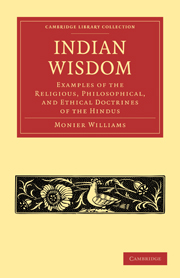Book contents
- Frontmatter
- PREFACE
- THE INDO-ROMANIC ALPHABET WITH THE EQUIVALENT SANSKṚIT LETTERS AND RULES FOR PRONUNCIATION
- Contents
- INTRODUCTION
- LECTURE I The Hymns of the Veda
- LECTURE II The Brāhmana Portion of the Veda
- LECTURE III The Systems of Philosophy
- LECTURE IV The Nyāya System of Philosophy
- LECTURE V The Sānkhya System of Philosophy
- LECTURE VI The Mimāṉsā System of Philosophy
- LECTURE VII Irregular Systems and Eclectic School
- LECTURE VIII Smṛiti. The Vedāngas
- LECTURE IX Smārta-sūtra. Gṛihya, ‘domestic rules’
- LECTURE X The Law-books. Mainu continued
- LECTURE XI Metrical Version of some of Manu's Moral and Religious Precepts
- LECTURE XII The Epic Poems
- LECTURE XIII The Mahā-bhārata
- LECTURE XIV The Epic Poems compared together and with Homer
- LECTURE XV The Artificial Poems
- INDEX
- ADDITIONS AND CORRECTIONS
- ORIENTAL WORKS
LECTURE VII - Irregular Systems and Eclectic School
Published online by Cambridge University Press: 29 August 2010
- Frontmatter
- PREFACE
- THE INDO-ROMANIC ALPHABET WITH THE EQUIVALENT SANSKṚIT LETTERS AND RULES FOR PRONUNCIATION
- Contents
- INTRODUCTION
- LECTURE I The Hymns of the Veda
- LECTURE II The Brāhmana Portion of the Veda
- LECTURE III The Systems of Philosophy
- LECTURE IV The Nyāya System of Philosophy
- LECTURE V The Sānkhya System of Philosophy
- LECTURE VI The Mimāṉsā System of Philosophy
- LECTURE VII Irregular Systems and Eclectic School
- LECTURE VIII Smṛiti. The Vedāngas
- LECTURE IX Smārta-sūtra. Gṛihya, ‘domestic rules’
- LECTURE X The Law-books. Mainu continued
- LECTURE XI Metrical Version of some of Manu's Moral and Religious Precepts
- LECTURE XII The Epic Poems
- LECTURE XIII The Mahā-bhārata
- LECTURE XIV The Epic Poems compared together and with Homer
- LECTURE XV The Artificial Poems
- INDEX
- ADDITIONS AND CORRECTIONS
- ORIENTAL WORKS
Summary
BEFORE passing to the Eclectic School I must notice briefly two heretical and irregular systems of philosophy, which probably grew out of Buddhism, or at least have much in common with it as well as with the six orthodox systems just described.
These two systems are, 1. that of the Jainas or Jains, 2. that of the Cārvākas or Materialists. They are described in the celebrated Mādhavāćārya's work, called Sarva-darśana-san-graha, which is a concise description of various Hindā systems and sects, religious and philosophical, orthodox and heterodox, even including the science of applying quicksilver (raseśvara, regarded as a form of Śiva) or its preparations to various chemical and alchemical operations, and embracing also Pāṇini's theory of grammar.
Mādhava's account of the Jainas or Jains, whom he calls Ārhatas (from arhat, ‘venerable,’ applied to a Jina or chief saint), comes third in his list of sects, and naturally follows his exposition of the Bauddha doctrines. Jainism is, in fact, the only representative of Buddhistic ideas now left in India, and has so much in common with them that, having already gained some insight into Buddhism, we need only notice a few of the distinctive features of a system which is certainly its near relation, if not its actual descendant.
The Jainas, who are still found in great numbers in various parts of India, are divided into two principal sects or parties,—1. the Śvetāmbaras, ‘clothed in white garments;’ 2. the Dig-ambaras, ‘sky-clad’ or ‘naked;’ the latter, however, wear coloured garments, except while eating, and are required to carry peacock's tails in their hands.
- Type
- Chapter
- Information
- Indian WisdomExamples of the Religious, Philosophical, and Ethical Doctrines of the Hindus, pp. 127 - 154Publisher: Cambridge University PressPrint publication year: 2010

